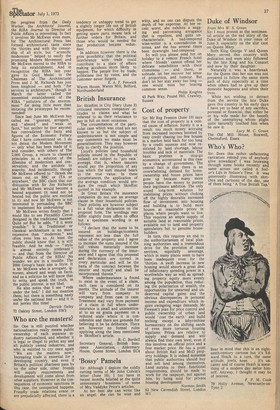Who are the masters?
Sir: One is still puzzled whether nationalisation really means public ownership of each separate industry nationalised, and whether it is legal or illegal to picket any and all publicly owned industries, and who is entitled to cry once again "We are the masters now." Increasing trade is essential for a developing country, and even if Britain's political pharisees pass by on the other side, other friends Will supply requirements and development will come about from other suppliers. However in the consequences of economic sanctions in this case, the unexpected happens. Friendly trade relations cease or are prejudicially affected, there is a tendency or unhappy trend to get a slightly longer life out of British equipment, for which difficulty in getting spare parts means lack of further orders for Britain, and those who would be needed for that production became redundant.
In addition however there is the grim possibility that the political interference with trade could contribute to a state of affairs making accidents more likely to happen. The people live by trade, politicians live by votes, and the customer never forgets.
E. A. F. Fenwich Waren House, Waren Mill, Belford, Northumberland






















































 Previous page
Previous page